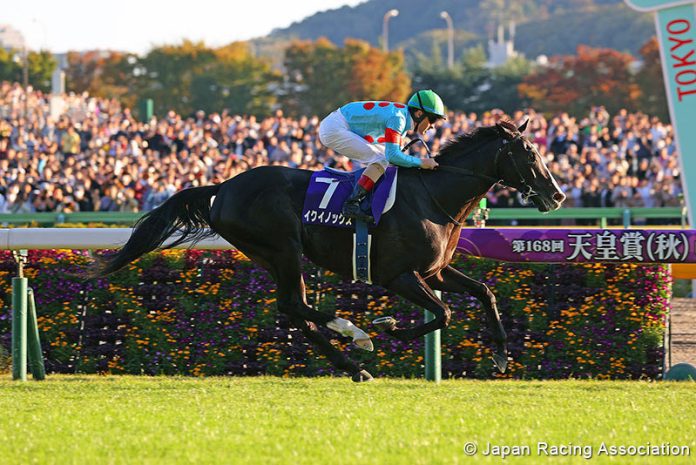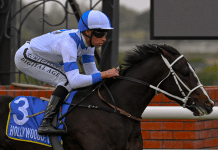
On Sunday (26 November), the eyes of the world turn to Tokyo Racecourse for the 43rd running of the G1 Japan Cup (2400m) – the international invitational – as 17 of Japan’s best and a sole challenger from overseas clash in the coveted contest.
This year, only one horse from overseas – French-trained Iresine – has made the trip to Japan amid a field that looks so uneven even a big allowance might not be enough to level it. Then again, it’s racing and as fans know all too well, anything is possible.
Equinox, who earned a world-topping 129 points in the rankings this spring and is on a five-race Group 1 winning streak, and Liberty Island are the hands-down headliners. A handful of other names earn mention as capable of making a trio or at least a share of the JPY1.085 billion (approx. HK$56.85 million) purse.
They include three-time Group 1 winner Titleholder (just off a second in a Group 2 over 2200m at Nakayama), 2022 G1 Yushun Himba (2400m) winner Stars On Earth, 2022 G1 Tokyo Yushun (2400m) winner Do Deuce, and the unpredictable Deep Bond (returning from a Group 2 third over 2400m at Kyoto).
Equinox, a four-year-old son of 2016 Japan Cup winner Kitasan Black, returns from a win of the G1 Tenno Sho Autumn (2000m) a mere month ago. Last year he also won the Tenno Sho, but was given the G1 Arima Kinen (2500m) next, which he won.
Following Wednesday’s (22 November) final fast work, Thursday’s sports paper headlines proclaimed the colt’s prospects of victory, but Liberty Island, a three-year-old who just aced Japan’s Triple Tiara, is getting equal billing.
The G1 Shuka Sho (2000m), the final test of the three filly Classics, was held at Kyoto on 15 October, two weeks before Equinox landed the Tenno Sho. That gave Liberty Island the freedom to get a bit more rest before taking on the Tokyo 2400m, the same course and distance over which she captured the Yushun Himba – this spring.
Though Equinox’s connections still exhibit confidence, an underlying current of uncertainty is slightly perceptible.
Excited for Japan Cup weekend! 🐎🤞🏼 #Equinox #JapanCup #CL pic.twitter.com/lAte9eFoEh
— Lemaire Christophe (@christo68914587) November 23, 2023
Christophe Lemaire, who has ridden all the colt’s 9 starts, says of the relatively tight rotation, “I don’t think it’s a problem. He’ll take on the Japan Cup in top condition and I think he’ll give us some very good results,” he said.
Lemaire, who did not ride Equinox’s work this week or last, says the colt is at his best. “He’s physically strong and mentally tough. He reached his peak this autumn,” he said.
But, Lemaire also does not ignore the very real threat from Liberty Island. “Liberty Island was the best of the three-year-old fillies and she has everything. The combination of her speed and stamina is amazing. And carrying 119lb, I think she has a chance,” he said.
“Of course, when I ride Equinox, I always ride with the confidence that he is going to win. I am really looking forward to this battle between Equinox and Liberty Island and it makes me want to win a Group 1 even more.”
Tetsuya Kimura, who trains Equinox at the eastern training centre of Miho, had the colt breeze over 1000 metres on the flat on Wednesday. Kimura focused on the basics, and says Equinox “was well-balanced under way.”
EQUINOX (middle) final fast ahead of the Japan Cup
Clinical. Within 0.1 sec of his final work before the Tenno Sho. Precision. #HeroIsComing pic.twitter.com/wde3y6DBAZ
— Graham Pavey (@LongBallToNoOne) November 22, 2023
“He was patient and waited for the rider’s signal, then picked up the pace and ran solidly to the end. It was a good workout, as usual,” Kimura said.
“It’s what we always do, and I’m not going to make any empty promises but I and my staff will be doing our best over these last few days to get him to the gate in the best of condition.”
Mitsumasa Nakauchida, Ritto-based trainer of Liberty Island, was much more upbeat.
“Last week’s workout was just to let off some gas. I checked her movement and breathing, but it wasn’t that hard of a workout. This week I had the jockey (Yuga Kawada) ride so he could get a reading on her. She moved well and the jockey was pleased. He pushed her a bit in the final stage and I think her time was a good one,” Nakauchida said.
LIBERTY ISLAND final work ahead of the Japan Cup
The King swinging on her.
Good luck beating her
— Graham Pavey (@LongBallToNoOne) November 22, 2023
“This fall (autumn), she’s only had one race. She’s on the up and up and I think she’s overall a level above what she was in the Shuka Sho.
“We do go in to the race as a challenger and, of course, I’m tense, but I’m also excited. She’s three years old and this will be her first time up against older horses. And there are many strong runners. I think the nine-pound allowance is big help and I hope that she uses it to her advantage,” he said.



